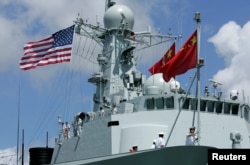The United States has disinvited China from a major international maritime exercise, saying Beijing's "destabilizing behavior" in the South China Sea is inconsistent with the principles of the U.S.-led drill.
"China's continued militarization of disputed features in the South China Sea only serve to raise tensions and destabilize the region," read a statement from Lieutenant Colonel Christopher Logan, a Pentagon spokesman.
The statement said that disinviting China from the 2018 RIMPAC is an "initial" response to Beijing's South China Sea activities. It did not specify what other steps may be taken.
Since 2014, China has taken part in RIMPAC, the world's largest international maritime drill, which is held every two years in Hawaii. It's a reflection of expanding U.S.-China military ties, despite tensions over Beijing's construction of man-made islands in the South China Sea, some of which have been militarized.
"We have strong evidence that China has deployed anti-ship missiles, surface-to-air missile (SAM) systems, and electronic jammers to contested features in the Spratly Islands region of the South China Sea. China's landing bomber aircraft at Woody Island has also raised tensions," the Pentagon statement said.
"We have called on China to remove the military systems immediately and to reverse course on the militarization of disputed South China Sea features," the statement added. "We believe these recent deployments and the continued militarization of these features is a violation of the promise that (Chinese) President Xi (Jinping) made to the United States and the World not to militarize the Spratly Islands."
China claims virtually the entire South China Sea, despite overlapping claims by Brunei, Malaysia, Taiwan, the Philippines and Vietnam. The area is rich in fish, oil and natural gas resources. It's also a vital shipping lane. About $5.3 trillion worth of goods moves through the sea every year, according to the U.S. Department of Defense.
U.S. ships and aircraft have conducted regular "freedom of navigation" operations (FONOPS) near some of the Chinese installations. But the Pentagon's decision to boot Beijing from RIMPAC suggests U.S. officials realize the FONOPS were not enough to deter China, says Harry Kazianis, director of Defense Studies at the Center for the National Interest.
"China should never, ever have been invited to RIMPAC. Period," Kazianis said. "Considering their aggressive approach to dominate the Asia-Pacific region, turn the South China Sea into their own personal lake, as well as diminish America's position in the region, this move on the Trump administration's part makes sense."
The decision comes at a particularly sensitive moment in U.S.-China relations. Washington and Beijing are engaged in negotiations aimed at averting a trade war. Those talks have been complicated by plans for a nuclear summit with North Korea, a major ally of Beijing.





